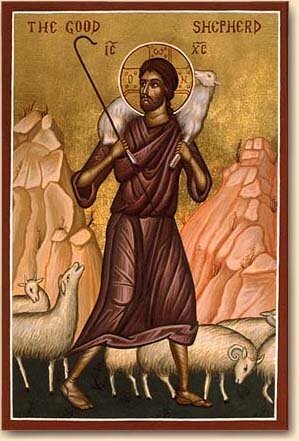Breaking Open the Word - 4th Sunday of Easter, Year B
4th Sunday of Easter, Year B — April 25th, 2021
This week, Mother Church offered us her annual meditation on Christ’s beautiful “Good Shepherd discourse.” As familiar as the image of Jesus the Good Shepherd is to us as Christians, there are always new depths to discover and explore! We opened our Scripture sharing by reflecting on the beautiful Collect for this Sunday, in which the Church prays “that the humble flock may reach where the brave Shepherd has gone before.” As a Sister pointed out, this prayer highlights the “littleness” of us as the sheep very clearly, yet it gives us the amazing hope that we can do what seems beyond our spiritual strength because our Lord has opened the way for us. We could not tread the path to heaven on our own, but we can – and must! – follow Christ on this path.
One Sister was particularly struck by the emphasis which Jesus lays on the sheep being His “own.” In a sense, this must be our primary identity; we must first and foremost remember that we are His, and that as such we are infinitely precious to Him. He is not a “hired hand who works for pay” and who sees caring for the sheep merely as a way to meet his own needs. Christ loves each and every soul with all the ardor of His Sacred Heart, and He would sooner lay down His own life than see His “sheep” perish. In the Old Testament He told Israel, “the LORD your God is a jealous God.” This Divine “jealousy” manifests itself in His refusal to allow sin and Satan to steal our hearts and lives from Him.
Another Sister highlighted the verse about “other sheep who do not belong to this fold.” While this refers first and foremost to the Gentiles, it could also be seen in a contemporary context as referring to those who lack faith. Despite their formal separation from Jesus, He still claims them as His sheep, and He is willing to pursue them tirelessly with His mercy, that they may enter the “one fold.” Bringing in the Parable of the Lost Sheep from Luke 15, we might also ask: what about the “other ninety-nine” who have not left the fold? Are they forgotten by Christ in His passion to save the wanderers? Not at all! It is their job to help the Shepherd in whatever way He asks, and to participate in His joy when He returns with the beloved “stray” upon His shoulders.
Continuing this theme of the importance of being “His own,” we turned to the Second Reading. St. John never tires of repeating with awe the incomprehensible dignity that is ours as Christians – as members of His fold. Jesus comes not just to save us from sin, but to draw us into the very life of the Trinity, to “see Him as He is” and to know Him “as I know the Father and the Father knows Me.” This Sunday was also the World Day of Prayer for Vocations, and we discussed how this intimate union with and vision of the Father, Son, and Holy Spirit is truly the goal of every vocation. To the extent that we are faithful to God’s call in our life, we will be able to see the veil between us and Him grow thinner and thinner as we die to ourselves and rise with Him. No wonder the Saints were so eager and even impatient for the day of their death, when that veil would finally be torn!
Christ is, of course, the model of fidelity to the Father’s Will, and this is particularly shown in the final verse of today’s Gospel: “This command [to lay down His life and take it up again] I have received from My Father.” Jesus had a very clear and concrete awareness of what the Father asked of Him. He was sent to this earth knowing that He had not come to fulfill some vague, general mission, but to accomplish a specific act of self-sacrifice and redemption on the Cross. Most importantly, Our Lord did not merely accept His Paschal Mystery– He embraced and willed it, thus making it into the greatest act of love the world has ever seen. This kind of heroic love is far above mere human ability, and yet we are asked to imitate it. How can this be? The answer lies in the power of the Father’s command. On our own, yes, we are completely helpless to lay down our lives in love. But every time God gives a commandment, a mission, a vocation, He also supplies the necessary grace to fulfill it. When we feel that we are facing a task beyond our strength in the spiritual realm, may we imitate the trust of St. Peter, who was able even to walk on water when he put his faith in Christ’s word! “Lord, if it is You, command me to come to You on the water.”


